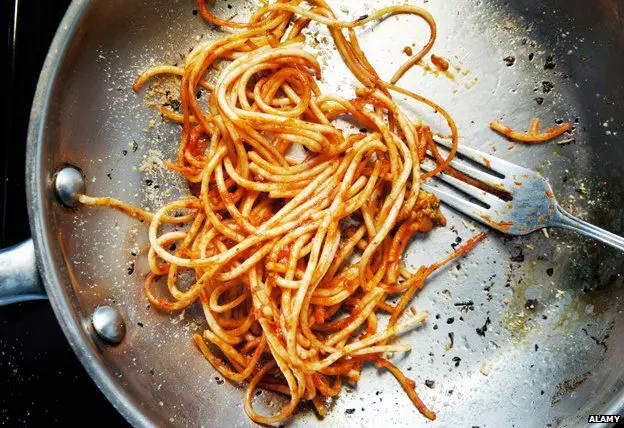The Science and Myths Behind Leaving Boiled Potatoes in Water Overnight
Boiled potatoes are an essential ingredient in many dishes around the world. They provide a great source of carbohydrates, vitamins and minerals. However, when it comes to leftover boiled potatoes, there seems to be much confusion regarding whether or not they should be left in water overnight. Some argue that it is unsafe to do so, while others argue that it’s perfectly fine.
So, can you leave boiled potatoes in water overnight? This article aims to explore the science behind boiled potatoes, debunk myths surrounding water storage of boiled potatoes, and provide alternatives and recommendations for safely storing leftover boiled potatoes.
The Science Behind Boiled Potatoes
To understand the effects of leaving boiled potatoes in water overnight, it is important to explore the chemical composition of potatoes. Potatoes are composed primarily of starch (mostly amylopectin), protein, and water. When exposed to heat (such as boiling water), the structure of the potato changes due to the breakdown of the amylopectin molecules.
This leads to a soft and fluffy texture that makes them great for mashing or adding to stews and soups. However, boiling can also result in the loss of some nutrients like Vitamin C.
The temperature at which potatoes are cooked also plays a significant role. Cooking above 100 degrees Celsius results in more starch breakdown leading to more tender and softer texture while lower temperatures may not break down enough resulting in firm texture.
When cooked potatoes are left in water for some time such as over night, they tend loosen up with further breakdown because of enzyme activity resulting into mushy texture with lessened nutritional value.
Debunking Myths Surrounding Water Storage of Boiled Potatoes
One common myth is that it is unsafe to leave boiled potatoes in water overnight. This myth stems from the belief that bacteria grow quickly in moist environments, which could lead to food poisoning. However, what most people don’t know is that boiled potatoes actually have a relatively low risk of bacterial growth.
The actual risk of bacterial growth in boiled potatoes left in water overnight can be minimized by following good hygiene practices and ensuring that the potatoes are fully cooked before storage.
Factors that Affect Leaving Boiled Potatoes in Water Overnight
The likelihood of bacteria growth increases when specific factors are not considered when boiling potatoes. The type of potato used, how it was stored prior to cooking, the temperature and quality of the water used and time between boiling and refrigeration play significant roles in the risks associated with storing leftover boiled potatoes in water.
- Type of Potato Used: Certain types of potatoes are more susceptible to breakdown than others when left in water overnight hence type of potato used will influence whether one will consider storing them overnight or not.
- Way they were stored before boiling: Potatoes should always be stored in a cool, dry place prior to cooking. Storage condition of the potato can have an impact on how long you can store boiled ones.
- Quality and Temperature of Water Used: Unboiled water contains some percentage of microorganisms which can only be eliminated by boiling which usually kills them all. Similarly, leaving the boiled potatoes for too long outside may also encourage growth of bacteria so this will influence the timing since once they are perfectly cooked it’s safer to remove them out lest they soak up too much moisture and loosen up.
- Duration between Boiling and Refrigeration: Ideally, it is advisable to refrigerate boiled potatoes immediately after they have been cooked or kept lukewarm if eaten shortly. Extended duration between boiling and refrigeration offers bacteria the opportunity to grow at a much higher rate.
Benefits and Drawbacks of Leaving Boiled Potatoes in Water Overnight
There are some benefits to leaving boiled potatoes in water overnight, including:
- Easier preparation for future recipes: By leaving boiled potatoes in water overnight, it makes the next day’s cooking process faster and easier as they will simply need to be drained rather than re-boiled.
- Enhanced flavor absorption by the potatoes: Leaving boiled potatoes in water overnight allows them to absorb more flavours from spices, herbs or stocks used during boiling which may enhance taste profiles.
- Minimal nutrient loss compared to other preservation methods: Because no additional preservatives are added, there is very little nutrient loss when storing boiled potatoes in water.
However, leaving boiled potatoes in water overnight can also come with some drawbacks, including:
- Risk of Bacterial Growth: As mentioned previously, there is a risk of bacterial growth if potatoes are not stored properly after boiling even though this risk can be minimized by observing basic hygiene practices.
- Additional Flavor Changes: Leaving boiled potatoes in water for too long can result in changes to the texture and flavor profile. Hence it’s advisable to minimize soaking time.
- Mushy Texture Changes During Storage: Depending on how long the potatoes are left soaking in water overnight and temperature readings at that time, they could become mushy or waterlogged due to further breakdown and absorption of more moisture.
Alternatives to Leaving Boiled Potatoes in Water Overnight
There are some alternatives to leaving boiled potatoes in water overnight that can still ensure their freshness. Some of these alternatives include refrigeration, freezing, and air-drying.
Refrigeration
If you decide not to leave boiled potatoes in water overnight, refrigeration offers a safe alternative. To properly refrigerate boiled potatoes:
- Drain the potatoes of any excess water immediately after boiling.
- Wait for the potatoes to reach room temperature before transferring them to an airtight container or zip-lock baggie.
- You can store the boiled potatoes for up to three days in the coldest part of the refrigerator(lowest shelf or veggie drawer).
Freezing
Note: Freezing boiled potatoes may affect their texture and flavour so it’s not recommended as a preferred method.
If you choose to freeze leftover boiled potatoes, here’s what you need to know:
- Cutting consistency: Cut leftover boiled potatoes into evenly sized pieces before freezing which will ensure consistency in cooking once they are thawed.
- Storage materials: Transfer the cut pieces of boiled potatoes into freezer-safe bags or containers. Avoid overfilling bags with too many pieces of boiled potato as this could make defrosting a lot harder being that they tend to stick together.
- Thawing Technique: Frozen boiled potatoes should dethawed slowly in either fridge or at room temperature so that they don’t become too mushy and fall apart. Refrain from boiling after thawing as it may maltreat the texture and sturdiness of the boiled potatoes.
Air-Drying
Air-drying boiled potatoes before storage can be an alternative to refrigeration and water storage especially if used in potato crisps production. Air drying process help to reduce moisture content in the boiled potato through a well ventilated area on a seamless surface. Air dried boiled potatoes should be stored in an air tight container or zip lock baggie.
It’s essential to note that air-dried boiled potatoes are less fluffy than water-soaked ones hence not suitable for consume as whole meal .
Conclusion
In conclusion, leaving boiled potatoes in water overnight might not be entirely unsafe depending on how they are handled before cooking, while allowing for flavors to infuse within the potato flavour profile but coming with some drawbacks like bacterial growth and mushy texture changes. Therefore, it is paramount to keep hygiene and storage conditions in mind during the entire storage process or opting other storage methods like refrigeration, freezing, or air-drying.
Ultimately, the choice of storing method will depend on factors such as immediate future use of the boiled potatoes, preference in usage of soft or firm texture boiled potatoes among other personal preferences.. As always, it is always important to adhere to basic hygiene practices when handling food products.
#### Can boiled potatoes be left in water overnight?
Boiled potatoes can be left in water overnight, but they should be stored in the refrigerator to prevent bacterial growth.
#### How long can you keep boiled potatoes in water?
If properly stored in airtight container and refrigerated, boiled potatoes can be kept in water for up to 3 days.
#### Can I reheat boiled potatoes that have been soaked overnight?
Yes, you can reheat boiled potatoes that have been soaked overnight. Just make sure to remove any excess water before reheating.
#### Will leaving boiled potatoes in water affect their taste or texture?
Leaving boiled potatoes in water may affect their texture and cause them to become more mushy. However, it will not affect their taste as long as they are properly stored and used within a reasonable timeframe.






